Dec 04, 2018 Unexpected Connections in Review
On Wednesday morning, I walked into the Beverly O’Neill Theater a few minutes past 9 a.m. and was greeted by the hologram of John Maeda, the internationally lauded technologist and designer. 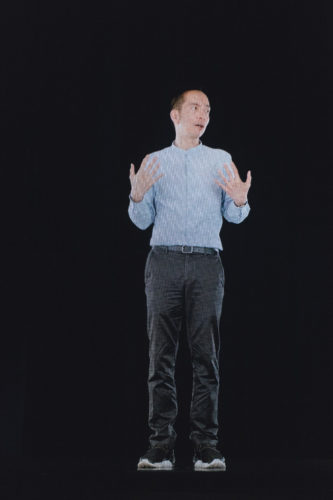 There he was on stage, his life-sized likeliness projected on a sleek LED screen, having a seemingly casual conversation with Julia Huang in the flesh.
There he was on stage, his life-sized likeliness projected on a sleek LED screen, having a seemingly casual conversation with Julia Huang in the flesh.
“Unexpected Connections” — a sold-out, all-day conference on cross-platform creativity — was the brainchild of Huang’s Imprint Culture Lab, a Long Beach-based entity that stewards creative startups, and Maekan, a Hong Kong-based multimedia platform that champions creative culture and storytelling.
In their first major collaboration, the event brought on some of the most influential creative luminaries across cultures, generations and platforms, including Japanese designer Kenya Hara, KCRW’s president Jennifer Ferro and host Madeleine Brand, global fashion creative mogul John C. Jay, “father of street culture” Jeff Staple (Staple Pigeon), visual artist David Choe, Chinese-American activist-journalist-author Helen Zia, Hong Kong-based restaurateur Lindsay Jang, social entrepreneur Karen Okonkwo, L.A. tattoo artist Jun Cha, creative designer for children Jason Mayden (Super Heroic), Australian creative director Yimmy Yayo and Maekan’s Eugene Kan and Charis Poon.
I knew that this was an unordinary event from the moment I checked in at the front table and was handed a sleek enamel pin bearing the event’s abstract black and white logo to don as my badge throughout the day. And, to my surprise when I walked in, a considerable portion of the 365 attendees were of Asian descent. It’s not often that I meet so many fellow Asian creatives in one room.
As one of the first speakers, John C. Jay, who spearheads Global Creative at Fast Retailing Co. Ltd. 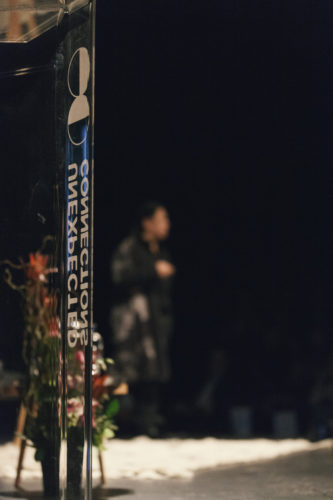 for fashion brands like Uniqlo, J-Brand and Comptoir des Cotonniers, deeply emphasized the need for pure, unadulterated curiosity in order to understand street culture and people. “Learn, unlearn and relearn,” he said. “Knowing it all” is the biggest epidemic among Americans — we must create from deep cultural insight, not from the slew of detached information we all have access to.
for fashion brands like Uniqlo, J-Brand and Comptoir des Cotonniers, deeply emphasized the need for pure, unadulterated curiosity in order to understand street culture and people. “Learn, unlearn and relearn,” he said. “Knowing it all” is the biggest epidemic among Americans — we must create from deep cultural insight, not from the slew of detached information we all have access to.
Mr. Jay also encouraged us to break out of our shells and talk to someone new at the event. Heeding his advice, I encountered a few unexpected connections that day:
-
During the lunch break, I carried my complimentary grain bowl wrap (courtesy of Roy Choi’s LocoL food truck) and plopped down at a random table. I got to chatting with a local couple: Laura works for the city of Long Beach and is a Korean-American who grew up in Downey, and Tim, a collector/restorer of vintage furniture and designer originally from Texas. Our conversation shifted in many directions and eventually led to Laura and I talking about our Korean upbringing. She also comes from a devout Christian family, and her late grandfather was a Presbyterian pastor, just like mine. Considering the tight-knit network of Korean pastors in Southern California, I have no doubt that they crossed paths at one point.
-
Artist David Choe’s “Unscripted” talk on stage began with him pacing back and forth in his bare-chested overalls. He told us that his dentist recently mentioned he excessively grinds his teeth due to his tendency to abstain from breathing deeply. He then led us in a deep breathing meditation exercise bestowing love and joy on our inner child and the inner child residing in
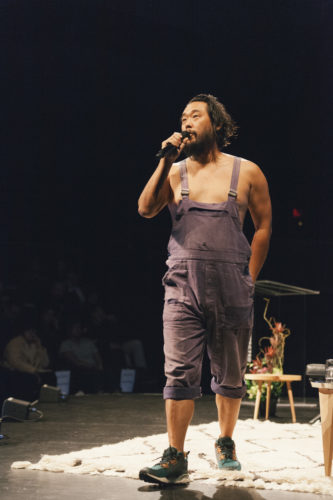 our loved ones as well as enemies. Speaking on the epidemic of fragile masculinity ingrained in most men today, he brought a volunteer onto the stage and shared an intimately long hug with him — crotches aligned, heartbeats matching. Choe then invited us to turn to the person sitting next to us and do the same. The lady sitting next to me was a professor at the Art Center College of Design, and after sharing two refreshing hugs, we discovered that my childhood best friend Erika was a former student of hers. She told me that she still shows one of Erika’s projects in class as an example
our loved ones as well as enemies. Speaking on the epidemic of fragile masculinity ingrained in most men today, he brought a volunteer onto the stage and shared an intimately long hug with him — crotches aligned, heartbeats matching. Choe then invited us to turn to the person sitting next to us and do the same. The lady sitting next to me was a professor at the Art Center College of Design, and after sharing two refreshing hugs, we discovered that my childhood best friend Erika was a former student of hers. She told me that she still shows one of Erika’s projects in class as an example
But back to Choe: the internationally-acclaimed visual artist did not mention art once in his 45-minute talk. But his raw, confessional monologues about self-love, ego, gratitude and the rigidity of his own upbringing felt keenly topical in a room full of creatives. One lady later told me it felt like one big communal therapy session. It was actually quite nice.
Other highlights for me included a panel talk with KCRW host Madeleine Brand and Helen Zia, who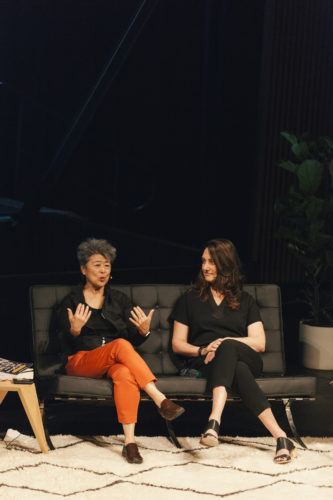 spoke about the agency in each of us as not only media professionals but as breathing humans in this current age of the 24/7 news cycle and information overload. It is our duty to comb through the fraught day-to-day load and to make sense of it in the larger context of our history in order to evolve as a collective.
spoke about the agency in each of us as not only media professionals but as breathing humans in this current age of the 24/7 news cycle and information overload. It is our duty to comb through the fraught day-to-day load and to make sense of it in the larger context of our history in order to evolve as a collective.
The panel conversation between Chinese-American streetwear entrepreneur Jeff Staple and Karen Okonkwo, the Nigerian-American cofounder of TONL — a stock photography company that champions equal representation for minorities — touched on similar topics. Both raised in white suburban towns, their “otherness” fostered in them both a fluidity to navigate among people different from them, as well as an urgency to understand people on a deep human level. But also, it fueled them to create communities that reflect their own heritage and be represented in the larger mainstream culture.
Around 6 p.m., the party moved to a reception at the Long Beach Museum of Art’s outside patio. Hip hop producer Dan the Automator manned the decks, and we were treated to complimentary drinks, deviled eggs, wings and gourmet handmade truffles courtesy of Long Beach’s Romeo Chocolates. Conversation flowed freely with lowered inhibitions as we sipped on our drinks and shared our thoughts on the day.
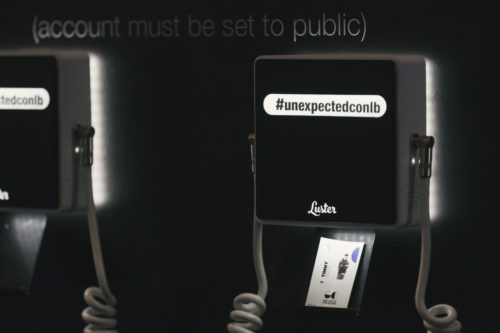 Later, coming out of the restroom, I bumped into Helen Zia, who is iconic to a queer Asian-American writer like myself. When I nervously told her that I was also a journalist, she graciously reminded me that my voice is unique and to never forget that. I couldn’t have imagined a better unexpected connection to end my day. It reminded me that while our lives and local communities often feel like a vacuum, we are unique individuals globally interconnected through our human experience and the urge to create.
Later, coming out of the restroom, I bumped into Helen Zia, who is iconic to a queer Asian-American writer like myself. When I nervously told her that I was also a journalist, she graciously reminded me that my voice is unique and to never forget that. I couldn’t have imagined a better unexpected connection to end my day. It reminded me that while our lives and local communities often feel like a vacuum, we are unique individuals globally interconnected through our human experience and the urge to create.
Guest writer Esther Kang is a Long Beach based journalist, musician, and all around creative.
Photo credits: Christina Choi – @cxchoi


